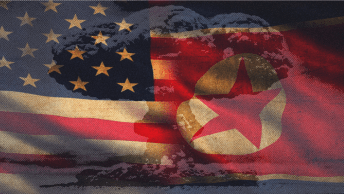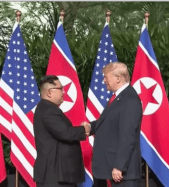Guest Post: David Maxwell asks “Is Kim Playing Trump?”
 This week’s guest post is from my friend Dave Maxwell, a retired Special Forces officer now a senior fellow at the Foundation for the Defense of Democracies (FDD) [see Dave’s info at the end of the essay]. Dave is reacting to a Reuters article that reports comments from President Trump’s former chief of staff, retired General John Kelly, that denigrate Trump’s efforts to denuclearize North Korea. Reuters says that:
This week’s guest post is from my friend Dave Maxwell, a retired Special Forces officer now a senior fellow at the Foundation for the Defense of Democracies (FDD) [see Dave’s info at the end of the essay]. Dave is reacting to a Reuters article that reports comments from President Trump’s former chief of staff, retired General John Kelly, that denigrate Trump’s efforts to denuclearize North Korea. Reuters says that:
“[Kelly] has dismissed the U.S. president’s unprecedented engagement with North Korean leader Kim Jong Un as futile, saying he had never believed North Korea would give up its nuclear weapons and Pyongyang had played the United States to its benefit.”
As we frequently observe on Lawfire®, things are often more complicated than they seem. This is why it is so helpful that Dave, who follows developments on the Korean peninsula very closely, takes a more analytical approach than that reported about Kelly. Dave’s insightful observations not only cogently illustrate the complexity of the situation, but also serve as the basis for this thoughtful recommendations for a ‘way ahead’. Here’s his take:
Is Kim Playing Trump?
By
David Maxwell
I would like to offer a response to General Kelly’s assessment that President Trump is getting played by Kim Jong-un.
I too believe that Kim Jong-un is unlikely to give up his nuclear weapons with the following caveat: he will do so only when he experiences sufficient internal pressure that makes him do so. He is not going to be externally coerced or co-opted into giving up his nuclear weapons. He may negotiate if the conditions can be created so that internal pressure from his military and regime elite is generated to make him change his calculus.
Political warfare
The U.S. and its friends, partners, and allies need to sustain maximum pressure to contribute to generating those internal conditions. At the same time the ROK/U.S. Alliance needs to cope, contain, and manage the security situation built on the foundation of deterrence by the ROK/U.S. Combined Forces Command. If those conditions cannot be generated to cause Kim to change his calculus, then we must remain focused on the long term objective of resolving the “Korea question” (paragraph 60 of the Armistice Agreement).
Yes of course Kim is trying to “play” Trump (as well as Moon). There should be no doubt about that. But that does not mean President Trump needs to get “played” or is getting played. Kim is playing his long con.
We need to play our long game. He is conducting “political warfare with juche characteristics.” We need to conduct a superior form of political warfare which leads to an acceptable durable political arrangement that supports, protects, and advances US and ROK/U.S. Alliance interests.
Understanding the root of the problem
We need to understand the root of all problems (and evil) on the Korean peninsula is the existence of the Kim family regime with its strategy that is based on subversion, coercion, extortion, and use of force to unify the peninsula under the domination of the Guerrilla Dynasty and Gulag State to ensure survival of the Kim family regime.
If Kim does not change his strategy and reduce his extreme objectives there is only one way to counter this strategy, end the nuclear, missile, and conventional military threats and the human rights abuses and crimes against humanity being committed against the Korean people living in the north: That is to solve the Korea question that results in a secure, stable, economically vibrant, non-nuclear peninsula, unified under a liberal constitutional form of government determined by the Korean people that will be known as a United Republic of Korea (UROK).
We should all keep in mind that while we think we are being played by Kim Jong-un (and he is trying to play us) it is Kim who is failing and has failed. The simple fact is that he has not achieved his major near-term objective of getting sanctions relief and this is a one of the main contributors to developing the internal pressure that can make him change his calculus.
Kim raised expectations since the Singapore summit and his military, elite, and the Korean people living in the north expected Kim to get sanctions relief. His failure to do so is the greatest failure of the three Kims.
Our commitment to not giving in to Kim’s blackmail diplomacy (and we witnessed this “diplomacy” in effect from May through December 2019 with 13 missile and rocket tests and hostile rhetoric) provides the only chance to convince Kim that his seven decades old playbook will no longer work against the U.S.
Sustaining maximum pressure 2.0
We have a chance to break the provocation cycle if we hold the line on sanctions and sustain maximum pressure 2.0 with diplomacy, military, cyber, counter-illicit activities, counter-proliferation, and a comprehensive information and influence activities campaign.
At some point in the future Kim must come to the conclusion that he must change his strategy or he will not survive. We cannot go wobbly on sanctions and pressure because to do so will set back relations with the north for decades as Kim will simply continue to conduct blackmail diplomacy to support his long- term strategy and objectives.
It is true that we have not achieved denuclearization and we are not even close to doing so. However, we should ask who is in the better strategic position? In every aspect the U.S. and the ROK/U.S. Alliance is in an advantageous position from military deterrence and economic power to international support for denuclearization.
Who is playing whom?
 The President’s unconventional, experimental, top-down diplomacy has created opportunities for engagement and understanding and has established the conditions for sustained diplomatic action if Kim chooses to negotiate. We can play a superior form of political warfare to prevent the outbreak of hostilities and cope, contain, and manage the security situation until the Korea question is resolved or until Kim changes his calculus.
The President’s unconventional, experimental, top-down diplomacy has created opportunities for engagement and understanding and has established the conditions for sustained diplomatic action if Kim chooses to negotiate. We can play a superior form of political warfare to prevent the outbreak of hostilities and cope, contain, and manage the security situation until the Korea question is resolved or until Kim changes his calculus.
Kim is back on his heels now deciding if he should continue blackmail diplomacy or exercise “strategic patience” to wait for the outcome of the U.S. presidential election in November. Kim is unsure of his own way forward because he is under increasing internal pressure for his failures and he cannot predict what POTUS will do. But time is not on Kim’s side. Who is playing whom?
 David Maxwell, a 30-year veteran of the United States Army and a retired Special Forces colonel, is a senior fellow at the Foundation for Defense of Democracies (FDD), where he also contributes to FDD’s Center on Military and Political Power (CMPP). Follow David on Twitter @davidmaxwell161. Follow FDD on Twitter @FDD and @FDD_CMPP. FDD is a Washington, DC-based, nonpartisan research institute focusing on national security and foreign policy.
David Maxwell, a 30-year veteran of the United States Army and a retired Special Forces colonel, is a senior fellow at the Foundation for Defense of Democracies (FDD), where he also contributes to FDD’s Center on Military and Political Power (CMPP). Follow David on Twitter @davidmaxwell161. Follow FDD on Twitter @FDD and @FDD_CMPP. FDD is a Washington, DC-based, nonpartisan research institute focusing on national security and foreign policy.
Guest posts do not necessarily reflect the views of Lawfire®, or the Center on Law, Ethics and National Security.
Still, as we like to say on Lawfire®, gather the facts, examine the arguments, and decide for yourself!


